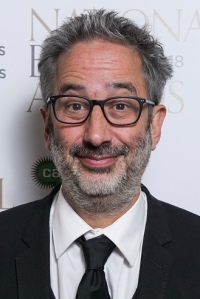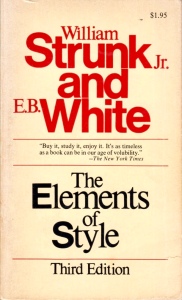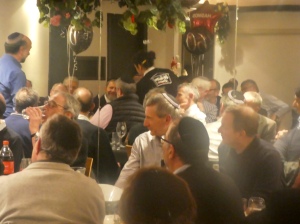“Come on! Let’s go to Cyprus to find Chishios!”
The throwaway idea came from ex-Hasmo Michael Murgraff while we were walking the dogs one early Jaffa morning, seven or eight years ago. No sooner had he proposed it, Murgraff, having a life, no doubt immediately forgot it . . . but he had unknowingly planted in me the tantalising prospect of a nostalgic quest for the Legendary scourge of the spastic.
The idea lay dormant for years. But, a few months ago, having completed my latest project and with too much time on my hands (I am looking for writing/editing work should anyone hear of any), I contacted George (aka “Joj”), with whom I had corresponded at the time of my original post on his father — see Hasmo Legends IV: Sick in the Head – Mr. Chishios — with the proposal that I visit Cyprus to interview him.
I doubt as much negotiation went into F*ckface Von Clownstick’s summit meeting with Kim Fatty III, but, on 5th March, I received the news that I had been hoping for: “I saw my dad yesterday and he said he was fine for you to come and see him.” Get in!! Within a couple of days, I had finalised my two-night trip to Nicosia.
The whole idea seemed a tad crazy, even to me, but the opportunity of meeting up with one of the ultimate Legends after all these years was simply one I could not pass up. (Thank you to the various ex-Hasmos with whom I could not resist sharing news of my impending trip for keeping it under your school caps. Henri Berest’s reaction best summed up my own excitement: “oh f*ck off. no way.”)
While it was lovely to finally meet George — who, in 1986, aged 15, accompanied his dad back to the island to take up his new teaching post — I found myself looking nervously over my shoulder all the time we were supping on our KEOs. Mr. Chishios is 80 now, but it was almost as if the memory of him, upside down Dunlop (toe forward) menacingly in hand, had been wired into my psyche. I had no idea what to expect. George had expressed concern, in our correspondence, as to whether his father’s memory might disappoint. And, to avoid that disappointment, I had prepared myself mentally for a meeting with a doddery old man.
 I needn’t have. Spotting the Legend for the first time, as he walked purposefully towards us, I intuitively knew that my trip would prove worthwhile. Chishios looked great and, after exchanging a warm hug, I must have told him so about half a dozen times. In fact, it felt more like four years had passed than 34. And I was so indescribably pleased to see him again.
I needn’t have. Spotting the Legend for the first time, as he walked purposefully towards us, I intuitively knew that my trip would prove worthwhile. Chishios looked great and, after exchanging a warm hug, I must have told him so about half a dozen times. In fact, it felt more like four years had passed than 34. And I was so indescribably pleased to see him again.
We sat down and jumped straight into Andreas George Chishios: The Early Years. Little details that I had forgotten came flooding back as we talked animatedly . . . the vigorous, overactive right index finger, for notable instance, though thankfully on my knee now rather than my breastbone.
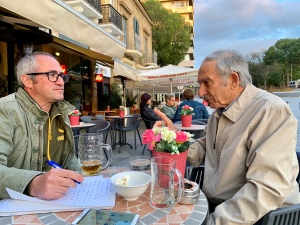
Chishios moved to the UK to further his education in 1956, aged just 18. His determination to advance, he recalled, was illustrated by his weaning himself off The Sun and The Mirror, and onto The Times, in order to perfect his English. And his first teaching post, at Fulham’s Henry Compton School in 1970, explained a lot about his Legendary “shock and awe” approach to discipline.
“It was a rough school. One fellow teaching English ended up in a psychiatric hospital. The headmaster gave me a cane and told me to use it. I had written permission for two strokes. ‘If they realise you are weak,’ he said, ‘you are finished. Be tough from the beginning. If you can teach here, you can teach anywhere.’”
“Very early on, I had trouble in the gym from a cheeky Indian boy. I looked around. There was no one there. I said ‘OK, I’ll fix you.’ I punched him in the chest and he fell down. I punched him again. ‘Patel,’ I said, ‘I am a Cypriot and I kill people!’ ‘Don’t kill me, sir,’ he begged. ‘OK,’ I said, ‘but tell the others he is a Cypriot and he kills people.’ I had very little trouble after that.”
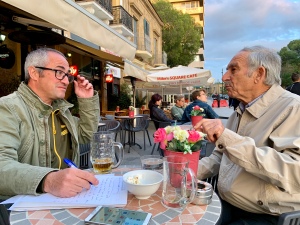
“There was another boy, a Jamaican called Brown, who was stealing other boys’ dinner money. I remember he had his thumbs in the front of his trousers, puffed out his chest and kept calling me ‘Chowman’, which must have meant something in Jamaican. I pinned him down on the bench in the gym and, with the help of another boy, dropped a one hundred pound bar on his chest. ‘What’s the matter with you, you chicken,’ I said. ‘Push it, you chicken! You are nothing. You are a chicken. If I catch you taking dinner money from boys again, I’ll murder you.’ And that was the end of that.”
In prison terms, then, Chishios’s move from Fulham — he was annoyed at not receiving a promised promotion — to Holders Hill Road in 1972 was like getting into a TARDIS at Scum and getting out at Porridge.
“Hasmonean was a grammar school. They were excellent students. Very well behaved. [mm: I kept shtum] They respected people. [mm: and again] There was no point in using the cane. When I was appointed, I went to see my predecessor, Mr. Jurke. ‘We use the slipper here,’ he said. So I did. But, after a while, it wasn’t necessary. The students knew I expected good behaviour. And I got it. [mm: and again]”

The main thing to come out of our meeting — which traversed pub, café and superb taverna, last Tuesday evening — was incontrovertible confirmation of my conclusion in my original post on the Legend: that, at Holders Hill Road, he had “unwittingly stumbl[ed] across a culture very alien to his own.”
“The non-frum students were better behaved. They listened to me. The others were much more difficult. For instance, they refused to take their kapels off when we were playing football. When you are playing football, you can’t wear that kapel with the clip. If you head the ball, it will damage your head. They thought I was against their religion, which wasn’t true. It was difficult to get through to them.”
“But the real shock for me was the people with the hats and the beards. This boy, I have forgotten his name, used to read the laws to me from a big book. [mm: The Code of Jewish Law?] ‘If I had to do what it says in here,’ he told me, ‘I’d go berserk!’ To me it is disrespectful to your wife not to sleep in the same bed as her when she has her period. How must she feel? Humiliated! And, with sex, the boy told me that the idea is not to enjoy it, but that it is just for having children. ‘Look,’ I said, ‘the most enjoyable thing in life is the woman’s body!’”
“Marks and Soester got me to talk to a 26-year old teacher [mm: who shall remain nameless here] who had three children but had never seen his wife naked. ‘You tell him about it,’ they said. So I did. I told him that one of the biggest pleasures in life is foreplay. [mm: the Legend was somewhat more explicit] ‘No, no,’ he said, ‘it’s not right! You Cypriots are sex maniacs!’”

“I will always remember one rabbi [mm: nameless again, though a couple of beers could do it!] telling me ‘The only thing I enjoy in life is my car.’ ‘But don’t you enjoy your wife,’ I asked. He didn’t reply.”
“Everything at Hasmonean seemed to be ‘kosher this’ and ‘kosher that’. But I remember Mr. Bloomberg telling me that, until he came to the school, he never knew there was even such a thing as kosher milk!”
It was clear that Chishios had a particular soft spot for Joe Paley — surprising, perhaps, since he was responsible for scratching the beloved “miniboos” — whose name he simply could not utter without the addition of the epithet “poor chap”. Until marrying his religiously “extreme” wife, Paley was apparently just a “normal guy” — not how many (any?!) ex-Hasmos will remember him — with a penchant for Greek food. “He was a very nice chap. But he couldn’t stand the religious side. She changed him completely. He went mad. I remember he used to go down to Goodge Street to pass the place where he used to eat souvlaki, just for the smell. He had a real problem with discipline, and I used to help him. Unfortunately, they got rid of him soon after I left.”
Having said all of that, Hasmonean was the highlight of Chishios’s career. “It was the best time of my life. I will never forget it. The students were excellent. I was getting results. I was teaching skills, and they appreciated it. And the staff were great. I used to get on with everybody. And they helped me a lot with the Sports Day. I was very grateful for that.”

Having taught over five thousand pupils in a career spanning thirty years, it is only natural that, while the name “Chishios” still resonates deeply with many of us, he has long forgotten nearly all of ours. Most of the names I mentioned (even those like Koffman and Elbaz) drew a complete blank, while a few others — due to their sporting ability (Felsenstein, Nachshon and Haruni) or the fact that they went on to sell his Dollis Hill home (Leigh Topol) — brought fond recognition.
Chishios hasn’t forgotten his former colleagues, though, especially the liquid lunch crew of Marks, Soester, Hackett, Joughin, and, later, Sue Schneider. Martin Hackett has visited Cyprus a number of times, and is due there again later this year.

While Chishios clearly enjoyed my recounting of the many tales told about him on melchett mike, his reaction was almost as if they were about someone else (or, at least, a past life). As well as the Legendary Dunlop — which he only used because Mr. Jurke had forgotten to take it into retirement with him — he also claimed to have no recollection of ever having used the word “spastic”. “I don’t really remember it. Perhaps I said it. If they were not working hard. If they were not doing things correctly. I might have said that. But I don’t really remember it, to be honest.”
He also had no knowledge of, and seemed genuinely surprised by, accusations of perviness which I informed him had been levelled against one former colleague of his in particular.
George sat rapt through the four or five hours of lively reminiscence and storytelling, enjoying learning new things about his father, while visibly cringing, on occasion, at his more outrageous, often explicit, utterances. My assessment of the Legend, in my original post, as more “politically wrong” than incorrect was bang on. He recalled getting seriously pissed off with his noisy new West Indian neighbours in Kilburn, as his son politely pointed out the irony of his somewhat dodgy views on the subject of immigration to the UK. “He just doesn’t get it,” George said to me in an aside.
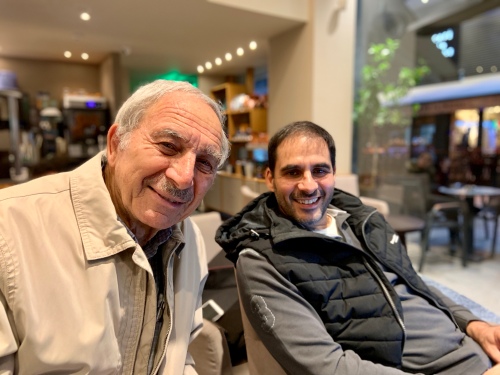
Chishios left Hasmonean in 1986, following an offer he simply could not refuse, to become Head of PE at the English School in Nicosia. He only accepted the position, however, after the headmaster had guaranteed to build a proper gymnasium (it was completed in three years — compare that to the laughably drawn-out Hasmo minibus saga). Chishios retired, at the then compulsory retirement age of 60, in 1999.
We met at the English School, which he visits once a week to have coffee with a former colleague, the following morning. There had been no Dunlop there. “There were other ways of punishing them: detention and, in the hot weather, runs, sprints, press-ups, sit-ups and step-ups.” One former pupil George bumped into recently recalled how he had tried the old “I didn’t bring my kit” routine on his father. “Start running,” Chishios told him. “It was 35 degrees. I never forgot my kit again.”
Everyone I met told the same story about the Legend. Even the VAT refund officer at Larnaca Airport, who had started grilling me as to the nature of my visit. “To meet up with my old PE master,” I said. “He was a teacher at the English School in Nicosia.” Chishios had taught him, too! “Strict but fair,” was his assessment. And he didn’t dare rummage through my bag after that.
Chishios is enjoying his retirement, and is an active grandfather to his four granddaughters (two each from George and his daughter from his second marriage). But he has known sadness, too. The Turkish invasion of 1974 led to the theft and uprooting of the family’s beautiful and profitable fruit groves (30 acres) in Famagusta, just a few kilometres from his hometown of Paralimni (still his main home). His father never fully recovered. Chishios has little love for the Turks and, as a matter of principle, has — like many Greek Cypriots — never crossed into Turkish-occupied territory. He is very pleased about Cyprus’s increased cooperation with Israel, especially over the proposed EastMed gas pipeline.
I took my leave of Mr. Chishios with no little sadness. He had been hugely engaging and a generous host. He, too, seemed to enjoy our meetings, and was genuinely chuffed that an ex-Hasmonean would fly in to see him.

Mr. Chishios is clearly a more normal, well-rounded and compassionate individual than most of the assorted bigots, misfits and lunatics whom I recall from Holders Hill Road. According to comments following my original post, Rabbi Kahan had apparently labelled him an antisemite. That was clearly complete nonsense. If some of his language and behaviour were a tad outlandish on occasion, it probably had more to do with the shenanigans he had to put up with on a near daily basis. And, never mind get on an aeroplane, I wouldn’t even cross the road to greet any of the ‘mullahs’ who have relocated to Har Nof.
I told Mr. Chishios that a visit to Israel and An Evening with Chich would (unlike the pitifully attended Hasmo Boys’ pub meets) draw a very good crowd. He said he would certainly consider it.
My only request of him was that there be no requirement for white socks or jockstrap inspections.
“Don’t be funny, son.”
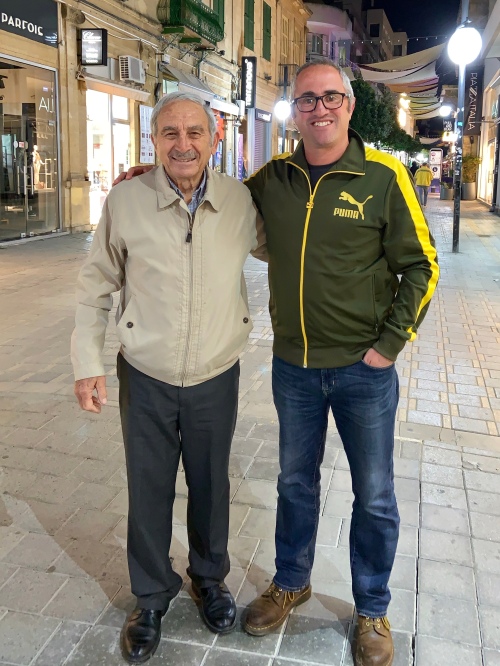
[Thank you to George, without whom none of this could have happened . . . and, of course, to his “old man” for being such a sport! For videos of the Legend from my trip, join the “Hasmo Boys” Facebook group.]

